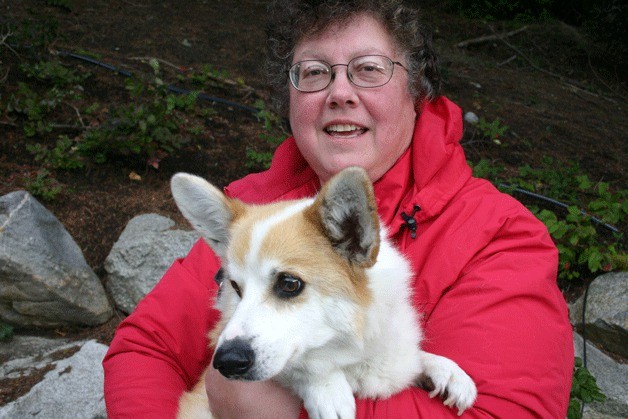When it comes to competition, Candy is more than dandy. He’s hell on wheels.
“Every rally he’s gone to, he’s come back with a title,” said his owner, Bobbie Mayer of Sunlight Beach. “He does an amazing job.”
And he wins his awards with two legs tied behind his back — well actually, with two legs tucked into a wheelchair.
Ten-year-old, brown-and-white Welsh corgi Candy was the only disabled dog in his class at a recent rally competition sponsored by the Association of Pet Dog Trainers in Redwood City, Calif., in the Bay Area.
“There was one blind and deaf Australian shepherd, but he was in a different level,” Mayer said.
The event involves about 20 stations, each with a sign telling competitors what to do — 360-degree turn, sit, heel, lie down, stay.
Candy was almost perfect for the course, Mayer said. He mostly gets dinged by judges for overeagerness, pulling ahead of Mayer, his handler.
“He’s a typical corgi,” Mayer said. “He’s very stubborn, he’s pushy and he likes to make noise.”
“But he loves to get into the ring and work,” she added. “Unlike practice at home, when he gets in front of a judge, he does everything right.”
Mayer said Candy lost the use of his hind legs at age 4 as a result of a not-uncommon genetic defect that can strike the breed.
She said Candy was going through his normal daily routine when several discs in his back began to rupture.
“He was walking across the living room floor, gave a yelp and started to become paralyzed,” Mayer said. “Now he’s basically a paraplegic from the waist down, except he doesn’t have a waist.”
Mayer acquired Candy about two years ago from his original owner, who could no longer lift him or carry him up and down stairs.
The original owner gave Candy his name, because her grandchildren, expecting a female puppy, had already chosen it and she didn’t want to disappoint them.
“He’s a happy dog,” Mayer said. “He likes to go to the beach and the dog park.”
“I like to take him out to meet people, to show them he has a quality life,” she added. “And he’s very healthy. He’s the only one of my four corgis who doesn’t take any medications.”
Mayer, a dog trainer herself, has three other corgis, including Jack, who’s about to begin his own rally career.
Candy’s wheelie rig was made by K9 Carts of Langley, one of only five companies in the United States producing similar products. The fact that the firm is located on the island made fitting and adjusting the device hassle-free, Mayer said.
That wasn’t the only local connection, she added: Candy’s first rally instructor was Carol Gannaway of Canine Potentials in Clinton.
Mayer has been a summer visitor to Whidbey since 1957. Her mother lives just down the street. Mayer, who teaches chemistry at Cal State University in Fresno, is currently semi-retired and divides her time between the island and California.
When she fully retires in about five years, she plans to replace her small cabin with a house — “something with insulation,” Mayer said.
Mayer’s not sure what’s next for Candy — maybe another go at the Bay Area rally competition next year.
She said there are only two canine organizations in the U.S. that allow disabled dogs to compete in their events, and both are in California.
She said Candy likes the Redwood City venue, because there are rubber mats on the floor.
“He can roll better,” Mayer said.
As for rolling around the South End, Mayer said she and Candy have discovered that there are very few wheelchair-accessible ramps and other aids commonly found in urban areas.
“There’s very little you can reach in a wheelchair in this area,” she said. “That’s something I think people need to do something about.”
“But that’s another story,” Mayer added.



